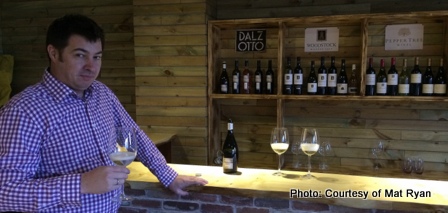
By Jim Boyce
“Desperate foreign producer seeks trustworthy China distributor to regularly exchange stack of cash for container of wine.”
If you could write a personal ad for the typical winery seeking entry into the China market, that might well be it. Good luck to them.
Meanwhile, some people are getting creative — and proactive — about selling wine in China. I looked at a few case studies for an upcoming piece in Wine Business International — click here for more info about the mag — and will post excerpts from some of the interviews.
First up is Mat Ryan of Podium Wines, a company formed by five Australian producers who decide to forgo finding distributors in China and instead handle it themselves. Ryan, who came to China ten years ago to set up a wine bar and has since been involved in the alcohol filed, touches on the financial benefits of Podium’s model, strategies for marketing the wine, reasons for choosing Qingdao rather than a city such as Beijing or Shanghai as a base, the government austerity program, and more.

On “cutting out the middle manâ€:
“Obviously the mainstream importers / distributors rely on the margins they make here to make their profits. As Podium is owned by the wineries we represent, we add only a small margin in order to cover our administrative and importing costs. The wineries sell to Podium at their normal sales prices, so in effect, our sub distributors buy at cost from us in China, resulting in a saving of 25 percent to 33 percent being passed down the line.”
On promoting Podium’s members:
We will be present at every major wine show in China over the coming years. There are literally hundreds of small importers / distributors that have in the past only dealt with French or Italian wines, as that’s all they’ve ever known. They know that they need an Australian option, as it’s number two [source of imported wine] in China, but they don’t want to gamble by buying a full container. It’s these guys that we want to find. Small guys, with a good sales network and a good group of customers, that need an Australian option, but the ability to buy small volumes. We will be finding these guys at the trade shows.
On adding wineries to the portfolio:
With a couple of the key founding partners, we decided amongst ourselves which of my current clients would be invited to participate. We’ve been careful to get a good mix of price points and geographical representation from the Australian wine regions. We have plans to add two or three more, but are in no hurry to do so. We’ve identified that we need a Barossa winery, and are working on bringing one of those in shortly, as well as possibly one from Margaret River.
On adding non-Australia wineries:
I think one of the reasons this model works for us, is the level of support that the wineries can get from the Australian government, in the form of grants and tax deductions. Having a single body of industry support like Wine Australia is also beneficial. I’m not sure whether it would be viable to bring in any other wineries from different countries, as it might hurt the level of support we can get.
On setting up headquarters in Qingdao:
We have plans to have a support office in Shanghai, but Qingdao is perfect for our model. We need to import and store large volumes of wine in a bonded warehouse, with the ability to quickly and easily send it anywhere around the country. Qingdao is very well located to service the north, south and to our west. The government is promoting the region as a logistics hub, and we are getting quite a lot of support from them. It’s also considerably cheaper to set the company up, and of course for our office and other expenses.
On the government austerity program:
I told anyone that would listen a year ago that this would hurt Penfolds and Lafite more than anyone else, and I’ve been proven correct. Treasury Wine Estates (owners of Penfolds) are sitting on shed fulls of Penfolds Bin 389 (also known as Baby Grange), as it was a tipple of choice for government banquets. It wasn’t as lavish as drinking Grange, but was still seen as high end. The cut backs have stopped this level of consumption.
Podium’s focus is on the individual consumer. It’s the younger generation that are now moving out of home earlier, hosting dinner parties with their friends, and experimenting with the wines they drink. The older generation still believes that wine is red and it comes from France, and that is going to be hard to change, so we are focusing on the next generation of leaders.
For more details about Mat Ryan and Podium Wines, see the upcoming issue of Wine Business International.
(Get my free Grape Wall e-newsletter. Subscribe here. Sample here. Follow Grape Wall on Twitter here.)
Grape Wall has no sponsors of advertisers: if you find the content and projects like World Marselan Day worthwhile, please help cover the costs via PayPal, WeChat or Alipay.
Sign up for the free Grape Wall newsletter here. Follow Grape Wall on LinkedIn, Instagram, Facebook and Twitter. And contact Grape Wall via grapewallofchina (at) gmail.com.

Leave a Reply
You must be logged in to post a comment.